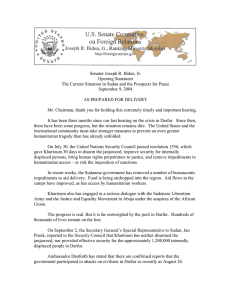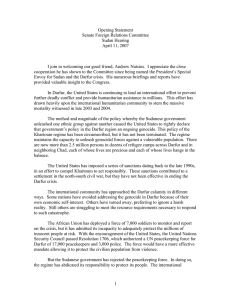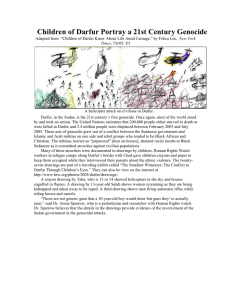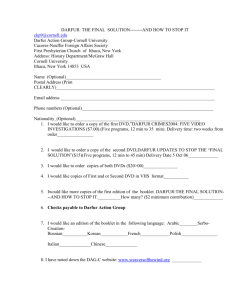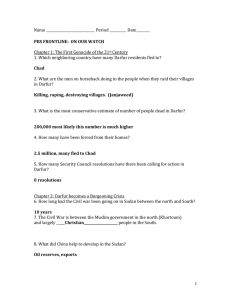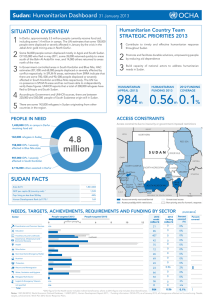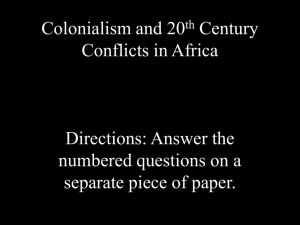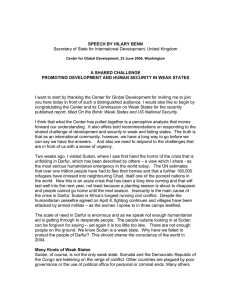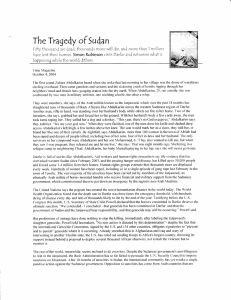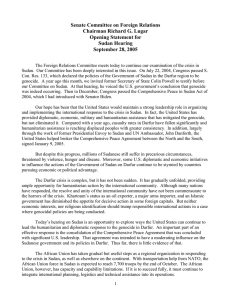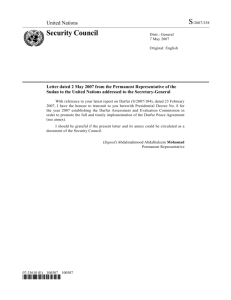Senate Foreign Relations Committee Chairman Richard Lugar September 9, 2004
advertisement
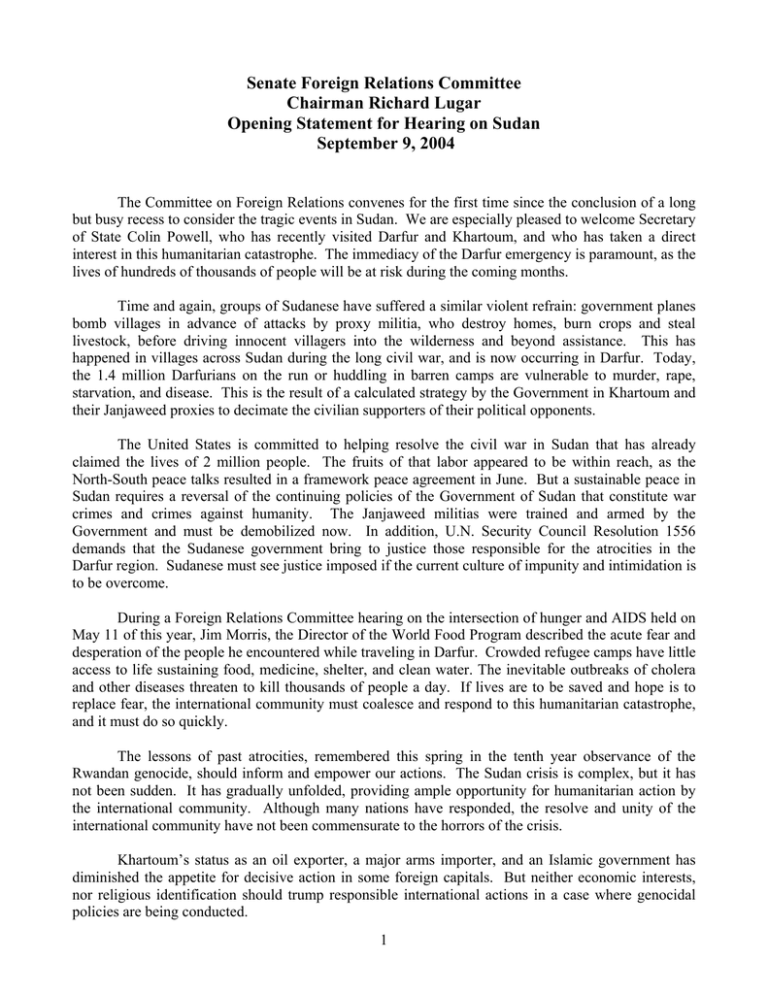
Senate Foreign Relations Committee Chairman Richard Lugar Opening Statement for Hearing on Sudan September 9, 2004 The Committee on Foreign Relations convenes for the first time since the conclusion of a long but busy recess to consider the tragic events in Sudan. We are especially pleased to welcome Secretary of State Colin Powell, who has recently visited Darfur and Khartoum, and who has taken a direct interest in this humanitarian catastrophe. The immediacy of the Darfur emergency is paramount, as the lives of hundreds of thousands of people will be at risk during the coming months. Time and again, groups of Sudanese have suffered a similar violent refrain: government planes bomb villages in advance of attacks by proxy militia, who destroy homes, burn crops and steal livestock, before driving innocent villagers into the wilderness and beyond assistance. This has happened in villages across Sudan during the long civil war, and is now occurring in Darfur. Today, the 1.4 million Darfurians on the run or huddling in barren camps are vulnerable to murder, rape, starvation, and disease. This is the result of a calculated strategy by the Government in Khartoum and their Janjaweed proxies to decimate the civilian supporters of their political opponents. The United States is committed to helping resolve the civil war in Sudan that has already claimed the lives of 2 million people. The fruits of that labor appeared to be within reach, as the North-South peace talks resulted in a framework peace agreement in June. But a sustainable peace in Sudan requires a reversal of the continuing policies of the Government of Sudan that constitute war crimes and crimes against humanity. The Janjaweed militias were trained and armed by the Government and must be demobilized now. In addition, U.N. Security Council Resolution 1556 demands that the Sudanese government bring to justice those responsible for the atrocities in the Darfur region. Sudanese must see justice imposed if the current culture of impunity and intimidation is to be overcome. During a Foreign Relations Committee hearing on the intersection of hunger and AIDS held on May 11 of this year, Jim Morris, the Director of the World Food Program described the acute fear and desperation of the people he encountered while traveling in Darfur. Crowded refugee camps have little access to life sustaining food, medicine, shelter, and clean water. The inevitable outbreaks of cholera and other diseases threaten to kill thousands of people a day. If lives are to be saved and hope is to replace fear, the international community must coalesce and respond to this humanitarian catastrophe, and it must do so quickly. The lessons of past atrocities, remembered this spring in the tenth year observance of the Rwandan genocide, should inform and empower our actions. The Sudan crisis is complex, but it has not been sudden. It has gradually unfolded, providing ample opportunity for humanitarian action by the international community. Although many nations have responded, the resolve and unity of the international community have not been commensurate to the horrors of the crisis. Khartoum’s status as an oil exporter, a major arms importer, and an Islamic government has diminished the appetite for decisive action in some foreign capitals. But neither economic interests, nor religious identification should trump responsible international actions in a case where genocidal policies are being conducted. 1 Secretary General Kofi Annan issued a warning last spring that a U.N. intervention might be necessary. Last week, following the expiration of the deadline set by Security Council Resolution 1556, he stated that attacks against civilians have continued, militias had not been disarmed, and that no concrete steps had been taken to arrest or even identify militia leaders and perpetrators of attacks. The threat of sanction must now be followed by the act of sanctioning the Sudanese government, perhaps by restricting the flow of oil that fuels that government with an estimated annual income of $2 billion. The African Union has responded to this challenge on its continent by deploying a Monitor and Protection Force to police the ineffective ceasefire signed in April. The African Union convened talks between the parties to the Darfur dispute in Abuja last week and called for an expanded force of 3,000 to 4,000 troops, including major contingents from Rwanda and Nigeria. The resistance by the Sudanese Government to this expansion is unacceptable. The international community should authorize the deployed African Union force, insist on its expansion to a size adequate to address the needs of a region the size of France, and give it a mandate to protect civilians. The Rwandan government, to its credit, has stated that its soldiers will not stand by if civilians are attacked. To be successful, this force needs to receive the resources and support necessary to operate in some of the harshest conditions on Earth. Congress has been active with respect to Sudan. On May 6, the Senate passed S. Con. Res. 99, which expresses Congressional concern over the deteriorating human rights and humanitarian situation in Darfur and condemns the Sudan government’s actions. On July 22, Congress passed S. Con. Res. 133, which declared the policies of the Government of Sudan in the Darfur region to be genocide. The Senate Foreign Relations Committee has been working on bipartisan legislation that is designed to provide significant funding to address the humanitarian crisis in Darfur and to advance the prospects for a comprehensive peace. The State Department has been very helpful in the Committee’s deliberations, advising us on how to approach this complex problem and on funding needs. Secretary Powell, we would greatly appreciate your personal assessment of the current situation and the prospect for a coordinated international response to the Darfur crisis, especially in light of the Secretary General’s report of last week. We understand that you are prepared to discuss the results of the State Department’s own investigation of the Darfur crisis, which is based on more than a thousand refugee interviews. Your thoughts on the approaching Presidential determination on the North-South Peace process would also be welcome, as well as any recommendations on our legislative efforts. Your presence here provides an excellent opportunity to expand public understanding of the crisis in Darfur and to strengthen the foundation for effective action. ### 2
